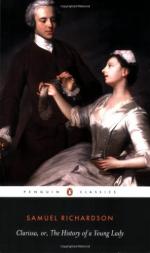I am sorry that I am obliged to repeat to you, my dear, who know me so well, that, were I sure I should live many years, I would not have Mr. Lovelace; much less can I think of him, as it is probable I may not live one.
As to the world and its censures, you know, my dear, that, however desirous I always was of a fair fame, yet I never thought it right to give more than a second place to the world’s opinion. The challenges made to Mr. Lovelace, by Miss D’Oily, in public company, are a fresh proof that I have lost my reputation: and what advantage would it be to me, were it retrievable, and were I to live long, if I could not acquit myself to myself?
Having in my former said so much on the freedoms you have taken with my friends, I shall say the less now; but your hint, that something else has newly passed between some of them and you, gives me great concern, and that as well for my own sake as for theirs, since it must necessarily incense them against me. I wise, my dear, that I had been left to my own course on an occasion so very interesting to myself. But, since what is done cannot be helped, I must abide the consequences: yet I dread more than before, what may be my sister’s answer, if an answer will be at all vouchsafed.
Will you give me leave, my dear, to close this subject with one remark? —It is this: that my beloved friend, in points where her own laudable zeal is concerned, has ever seemed more ready to fly from the rebuke, than from the fault. If you will excuse this freedom, I will acknowledge thus far in favour of your way of thinking, as to the conduct of some parents in these nice cases, that indiscreet opposition does frequently as much mischief as giddy love.
As to the invitation you are so kind as to give me, to remove privately into your neighbourhood, I have told Mr. Hickman that I will consider of it; but believe, if you will be so good as to excuse me, that I shall not accept of it, even should I be able to remove. I will give you my reasons for declining it; and so I ought, when both my love and my gratitude would make a visit now-and-then from my dear Miss Howe the most consolate thing in the world to me.
You must know then, that this great town, wicked as it is, wants not opportunities of being better; having daily prayers at several churches in it; and I am desirous, as my strength will permit, to embrace those opportunities. The method I have proposed to myself (and was beginning to practise when that cruel arrest deprived me of both freedom and strength) is this: when I was disposed to gentle exercise, I took a chair to St. Dunstan’s church in Fleet-street, where are prayers at seven in the morning; I proposed if the weather favoured, to walk (if not, to take chair) to Lincoln’s-inn chapel, where, at eleven in the morning, and at five in the afternoon, are the same desirable opportunities; and at other times to go no farther than Covent-garden church, where are early morning prayers likewise.




